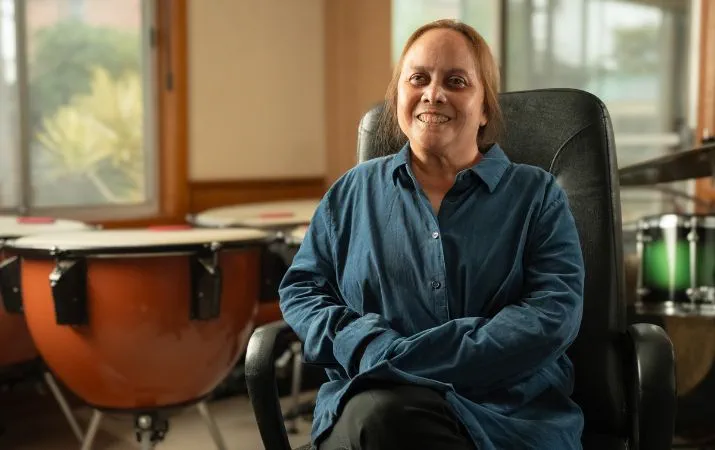How to choose a uni course when you live with ADHD
We asked a student advisor how you can beat decision paralysis, and find a course that clicks with your interests.

What should I study?
If you’re thinking of starting a course through Open Universities Australia, it’s a question that’s bound to enter your mind.
Should you follow your interests? Develop existing skills? And are you allowed to change path?
For students with ADHD, these questions may only begin to scratch the surface. Many ADHDers experience difficulty prioritising tasks and maintaining focus, and crave novelty to avoid feeling understimulated—all of which can influence course selection.
We’re here to shed light on some of these topics so you can feel more confident in your study choices. As our student advisor Nabila Jamal says, “find an internal motivation to fuel you” and you’re already on the right path.
What are you interested in learning right now?
Choosing a course is just the beginning of your educational journey. As you learn more about the subject, you’ll learn more about yourself.
As a student with ADHD, Nabila was “lucky to have a special interest in biology/neuroscience that has never wavered”. She liked solving problems and helping people, so she planned to become a doctor. She chose a Bachelor of Biomedical Science and a Bachelor of Health and Medical Science (Honours).
But as she progressed, her interests changed. Nabila soon found herself wanting to “contribute to discoveries” and preferring more independent work.
Many students with ADHD may feel excited to pursue their goals at the beginning—then uncover new interests as they progress through the course.
When Nabila nurtured her natural enthusiasm for a variety of subjects, she expanded her opportunity to learn.
“Despite having a clear vision of my major area of interest, I did have many areas I still wanted to explore that were wildly different from each other—from biomedical engineering to furniture design,” Nabila says.
As I developed, I realised being multi-passionate is something to embrace, not something to live in a constant state of paralysis within.”
Nabila now studies a Master of Bioinformatics.
“As long as you go for it wholeheartedly—even if it only lasts for a couple years or months—it has enriched your life and is worth pursuing to its end.

How do you find the right course?
When choosing a course, it can be helpful to think about how you’d like to use it in the future.Are you looking for a career change, or considering retirement? Are you already working and interested in exploring short courses?
For students with ADHD considering future career pathways, you might like to ask yourself:
- Will this course stimulate my creativity?
- Will I have the chance to keep learning new things through this career?
- Could I see myself studying or working in this area for a long time, or will it satisfy my immediate interests?
- Will this career path provide work-life balance?
Once you find your motivation, Nabila says “any career that falls under this umbrella will be rewarding to you”.
Fine-tuning your interests
Students with ADHD may find the quantity of course options overwhelming. This can lead to decision paralysis.
But remember, you’re in control of your study journey.
Through Open Universities Australia, students with ADHD can start with a short course or upskill with a single subject before committing to a full degree. It can be a great way to give study areas a test run.
“Pick your top four areas of interest, and just get started!” Nabila advises.
“You would be surprised by how transferable your skills are across unrelated careers.”
- Related reading: How to study with ADHD
Can there be a ‘wrong’ decision?
Starting a new course will boost your knowledge, advance your skills, and nurture your creativity—all of which bring extraordinary benefits.
Students with ADHD who still feel overwhelmed about course selection could “reflect on what a wrong decision looks like to them”. There could be a simple solution.
As Nabila advises, a fear of disliking the subject may be resolved by knowing you can leave before census date without incurring a fee.
You can even change your mind during your degree. Completing four units of university studies “makes it incredibly easy to gain entry into a wide variety of degrees”.
This means you can often switch to a new course and transfer the study credits you’ve already gained.
If you finish a course and find the career path isn’t for you, Nabila reassures that you’ve still opened the door to new postgraduate opportunities.
These are usually shorter than bachelor degrees, and can be helpful if you “want to make fast career changes”.
How Open Universities Australia can help
If you’re looking for inspiration, try this 2-minute quiz we designed to help you choose your course.
You can also check out our study planning tips to build a manageable courseload. You have the flexibility to complete as little as one subject at a time—or fully invest yourself in multiple subjects throughout the year. You can even scale up or down your courseload as you like at the start of each new study term.
For tailored advice, contact a helpful student advisor like Nabila.
“We’re all super friendly, so reach out to us and we can talk you through your pathway to get started,” she says.
“Don’t hold yourself back because of perceived hurdles. Life won’t change unless you make steps towards changing it—at least career-wise—and there’s support to help you.”
Start browsing courses through Open Universities Australia, or book a consultation for friendly advice.



